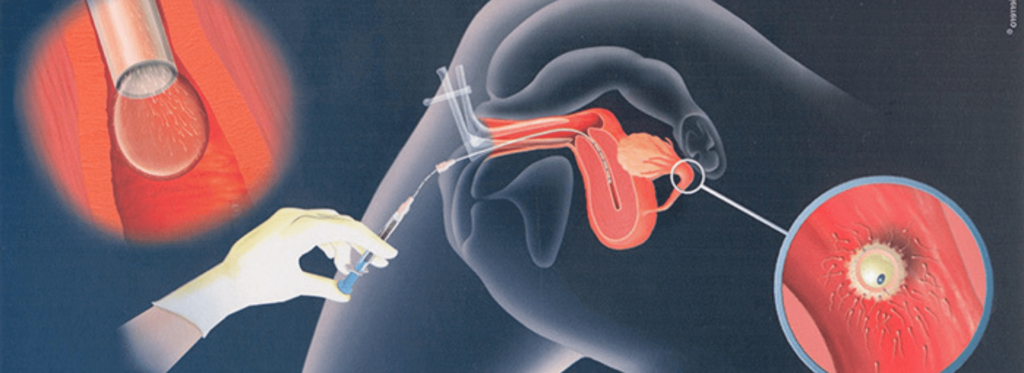
Intra Uterine Insemination Treatment in Indore
Maximizing the chance of fertilization requires Intrauterine Insemination (IUI), a fertility procedure that involves injecting sperm directly into a woman’s uterus. It is a relatively simple and less invasive fertility procedure compared to more advanced techniques like In vitro fertilization (IVF). IUI is often used as a first-line treatment for couples with certain fertility issues or for individuals who want to conceive without a partner.
Here’s an overview of the IUI process:
- Ovulation Monitoring: Before starting IUI, the woman’s menstrual cycle is closely monitored to determine the optimal time for insemination.
- Sperm Preparation: The sperm used for IUI is specially processed and prepared in the laboratory.
This process involves separating the healthy sperm from the semen and concentrating it to increase the chances of fertilization.
- Insemination: On the day of the IUI procedure, the processed sperm is inserted directly into the woman’s uterus using a thin, flexible catheter.
This procedure is usually painless and does not require anesthesia.
- Post-Insemination Rest: After the procedure, the woman may be advised to rest for a short period to increase the chances of successful implantation.
- Monitoring and Testing: In the following weeks, the woman may be monitored for signs of pregnancy. If pregnancy occurs, the process is considered successful. If not, the treatment may be repeated for a few cycles, depending on the individual’s circumstances and the doctor’s recommendations. The fallopian tubes will need to be checked as they will need to remain open for a while. Heavier men should be banned. Women who have unusual fallopian tube disease and who are known to have actual endometriosis are more likely to become pregnant after IUI.
The hoped-for result of intrauterine insemination is for the sperm to swim into the fallopian tube and fertilize a holding-up egg, coming almost in pregnancy. Depending on the reasons for fruitlessness, IUI can be encouraged beside your ordinary cycle or with readiness medications.
Why it’s done
It is done for various reasons when couples or individuals face challenges conceiving naturally.
Here are some common reasons why IUI may be recommended:
Unexplained Infertility: When a couple has been trying to conceive for a prolonged period, and no specific cause of infertility has been identified through medical evaluations, IUI may be considered a first-line treatment.
Male Factor Infertility: IUI is often recommended for couples with mild to moderate male factor infertility.
It can help by bypassing obstacles in the male reproductive tract, such as low sperm count, poor motility, or abnormal sperm morphology.
Cervical Issues: In some cases, the cervix may present a barrier to sperm reaching the fallopian tubes. IUI increases the chances of fertilization by bypassing the cervix and allowing sperm to enter the uterus directly.
Ovulation disorders: Women with irregular ovulation or anovulation (lack of ovulation) may benefit from IUI. Fertility medications may be used along with IUI to stimulate ovulation and improve the timing of conception.
Mild Endometriosis: IUI may be considered for couples where the partner has mild endometriosis. This can increase the concentration of sperm closer to the fertilization site, potentially increasing the chances of pregnancy.
Unsuccessful Timed Intercourse: If timed intercourse (having sex during the fertile window) has not resulted in pregnancy after several attempts, IUI may be suggested to improve the delivery of sperm to the egg.
Donor Sperm: IUI is commonly used in cases of male infertility, same-sex female couples, or single women who require donor sperm to conceive. IUI helps bypass this barrier.
Ejaculation Problems: Men who have difficulty ejaculating or who need sperm to be processed in a laboratory before insemination may benefit from IUI.
Semen Allergies: In rare cases, women may have an allergy to their partner’s sperm.
IUI can be used to minimize exposure to sperm proteins that trigger allergic reactions.
Unfavorable Cervical Conditions: Certain cervical conditions, such as cervical stenosis (narrowing of the cervix) or cervical mucus abnormalities, can hinder sperm transport. IUI helps overcome these obstacles.
IUI can assist women with sperm allergies, cervical conditions, and sperm transport issues by minimizing exposure to semen proteins and overcoming obstacles. It differentiates between normal and low-quality sperm during preparation. Cervical devastation can occur when the cervix, which forms the opening between the vagina and the uterus, thickens, affecting sperm movement. Scarring from biopsy or other methods may also cause the cervix to thicken.
IUI is commonly used for couples with the following conditions:
- Unexplained Infertility: When the cause of infertility cannot be identified.
- Cervical Issues: If the woman has cervical mucus abnormalities that affect sperm motility.
- Low Sperm Count or Motility: If the male partner has a mild to moderate sperm-related issue. 4. Donor Sperm: In cases where a single woman or same-sex female couple wishes to conceive using donor sperm.
- Ejaculatory Dysfunction: If the male partner has difficulty ejaculating during intercourse.
- Mild Endometriosis: In cases of mild endometriosis. It’s important to note that the success rates of IUI vary depending on individual circumstances and the underlying cause of infertility. Your healthcare provider will evaluate your specific situation and recommend the most appropriate fertility treatment option for you, which may include IUI or other advanced techniques such as IVF if necessary.
IUI Treatment – Intrauterine Insemination
This is a procedure in which sperm is “processed” and placed inside the uterus in a thin tube. A man’s partner produces sperm through masturbation. Sperm is separated from plasma, white blood cells, prostaglandins, and other “waste” that is usually filtered out during sex.
How does IUI treatment work?
A speculum should be inserted into the vagina to collect sperm. With the help of a syringe and catheter from the woman’s vagina, it is entered into the uterus where the sperm is located. The finished sperm is slowly introduced into the uterus through the catheter.
Why Choose ILC Infertility and IVF in Indore
- Women with Ovulation Dysfunction.
- Endometriosis Treatment Using Patented (Open) Tubes.
- Unexplained infertility – the cause is not explained. The aim is to increase the concentration of sperm in the blood vessels near the oocyte.
- Cervical factor infertility.
- PCOS can also be treated with IUI before using advanced techniques.
- Sperm distribution problems – ejaculation problems, retrograde ejaculation, previous surgery and treatment.
IUI process step-by-step
- The sample of sperm provided by the male partner at ILC Infertility and IVF Clinic, this sample is “washed” and filtered using special techniques.
- This ensures that only the highest-quality motile sperm are used for the procedure.
- The procedure for IUI is very similar to a transvaginal ultrasound scan.
- The washed sperm specimen is drawn into a sterilized IUI catheter which has a syringe attached to it.
- The IUI catheter is introduced to the patient’s cervix and then the IUI specialist injects the content of the syringe into the patient’s uterus.
- After this, the IUI doctor withdraws the catheter and removes the speculum.
- The patient is now allowed to straighten her legs and relax for about five minutes.
- This completes the intrauterine insemination.
- The woman can now get dressed and resume her regular activities.
- IUI happens to be a very convenient procedure as the woman is not advised bed rest or leave of absence.
Testing before treatment
Blood tests are performed on both male and female partners to identify diseases in the body, including many infectious diseases. Get tested for VDRL, hepatitis, and HIV.
Where is sperm stored?
Sperm is collected in a special room with magazines and videos and may be collected after intercourse or using non-oil condoms. If hospital collection is unavailable, samples can be collected at home and sent to the lab within 30 minutes, maintaining body temperature at 37°C.
When is sperm collected?
It is generally recommended to collect sperm for masturbation 3 to 5 days after abstinence.
How long does it take to produce sperm?
The process involves separating normal motility and morphology sperm from male partner sperm using rapid gradient separation technology. The resulting sperm is then washed and refined using sterilization equipment and is used in IUI treatment, typically within 15-20 minutes
How long does IUI take?
It takes a few minutes (1-2 minutes to insert the catheter), then another 2 minutes to inject the sperm and remove the catheter (slow insemination reduces discomfort).
When is the best time for IUI treatment?
Indore IUI treatment is effective after ruptured follicles, with two injections needed 24 hours after hCG injection and transplant. Checking for fractures daily increases pregnancy chances by 4 to 6 percent. Long-term fertilization (LH) measurement increases pregnancy probability by 3 to 4%.
Semen Collection
Wash your hands and personal belongings regularly with soap. Open the box and carefully fill in all the samples. Do not spill the sample. If there is a spill, notify the laboratory.
What are the factors affecting the success of IUI?
Understanding patient and treatment-related factors can help individuals and couples make informed decisions about intrauterine insemination (IUI), influencing its success.
Here are some key factors that can affect the success of IUI:
IUI is more likely to be successful when the cause of infertility is amenable to this treatment.
- Age: Female age is a crucial factor in fertility.
- Sperm Parameters: The quality and quantity of sperm used for IUI are essential.
- Women with tubal issues may have a higher success rate with in vitro fertilization (IVF). Cervical
- Mucus Quality: Cervical mucus plays a role in facilitating sperm transport to the egg.
- Duration of Infertility: Couples with a longer duration of infertility may have a lower chance of success with IUI, particularly if other factors are also at play.
- Lifestyle Factors: Lifestyle factors, such as smoking, excessive alcohol consumption, obesity, and poor diet, can negatively impact fertility and the success of IUI. Maintaining a healthy lifestyle can improve outcomes.
The choice of medication and the stimulation protocol should be tailored to the individual’s specific needs.
Patient’s Overall Health:
IUI success depends on managing chronic illnesses and optimizing overall health. Consult a fertility specialist for a thorough evaluation and recommended treatment plan.
What are the risks associated with IUI treatment?
- Perhaps the biggest risk after IUI is multiple pregnancies, especially if the woman becomes pregnant while taking fertility drugs.
- IUI treatment does not increase the risk of miscarriage.
- The risk of infection is very low.
- Birth control is important
Is IUI effective?
IUI success depends on infertility causes, uterine issues, and ejaculation problems, with factors like fertility drug use, woman’s age, and other infertility issues also influencing success.
What are the Pre-Requisites before IUI Treatment?
Tubes must be patent before IUI, and tubal testing is crucial. Severe factors, tubal conditions, and endometriosis cases may affect generality after IUI and fallopian tubes must remain open.
Consult ILC Infertility and IVF Center Indore for excellent IUI Treatment with or without fertility drugs to boost egg production for all your needs.
To experience Intracytoplasmic sperm injection (ICSI) at ILC Infertility and IVF Center Indore
For more Info, Consult with Our Counsellors and Expertise.
Book an appointment now for all your needs for IUI: +91–7574858084
